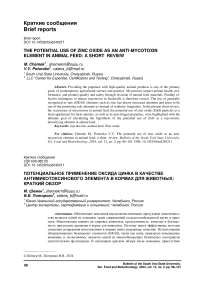The potential use of zinc oxide as an anti-mycotoxin element in animal feed: a short review
Бесплатный доступ
Providing the populace with high-quality animal products is one of the primary goals of contemporary agricultural science and practice. Mycotoxins impact animal health, performance, and product quality and safety through invasion of animal feed materials. Finding effective techniques to reduce mycotoxin in feedstuffs is therefore crucial. The use of generally recognized as safe (GRAS) elements such as zinc has drawn increased attention and seem to be one of the promising safe alternatives instead of synthetic fungicides. In the present short review, the occurrence of mycotoxins in animal feed, the potential use of zinc oxide (ZnO) particles as a feed supplement for farm animals, as well as its anti-fungal properties, were highlighted with the ultimate goal of elucidating the hypothesis of the potential use of ZnO as a mycotoxin-detoxifying element in animal feed.
Mycotoxins, animal feed, zinc oxide
Короткий адрес: https://sciup.org/147243932
IDR: 147243932 | УДК: 636.085.55 | DOI: 10.14529/food240211
Список литературы The potential use of zinc oxide as an anti-mycotoxin element in animal feed: a short review
- Wanapat M., Cherdthong A., Phesatcha K., and Kang S. Dietary sources and their effects on animal production and environmental sustainability. Anim. Nutr. (Zhongguo xu mu shou yi xue hui), Sep. 2015, vol. 1, no. 3, pp. 96-103. DOI: 10.1016/j.aninu.2015.07.004.
- Sarmast E., Fallah A.A., Jafari T., and Mousavi Khaneghah A. Occurrence and fate of mycotoxins in cereals and cereal-based products: a narrative review of systematic reviews and meta-analyses studies. Curr. Opin. FoodSci., 2021, vol. 39, pp. 68-75. DOI: 10.1016/j.cofs.2020.12.013.
- Naumenko N.V., Botvinnikova V.V. Studying the Risks of Grain Contamination with Mycotoxins of Toxigenic Molds. Bulletin of the South Ural State University. Ser. Food and Biotechnology, 2020, vol. 8, no. 2, pp. 74-81. (in Russ.) DOI: 10.14529/food200209.
- El-Sayed R.A., Jebur A.B., Kang W., and El-Demerdash F.M. An overview on the major mycotoxins in food products: characteristics, toxicity, and analysis. J. Futur. Foods, 2022, vol. 2, no. 2, pp. 91-102. DOI: 10.1016/j.jfutfo.2022.03.002.
- Yang C., Song G., and Lim W. Effects of mycotoxin-contaminated feed on farm animals. J. Hazard. Mater, 2020, vol. 389, p. 122087. DOI: 10.1016/j.jhazmat.2020.122087.
- Naumenko N.V., Botvinnikova V.V., Sottnikova V., Hrivna L., Beloglazova N.V. Mycotoxins and Security of Food Products: Obvious and Hidden Threats. Bulletin of the South Ural State University. Ser. Food and Biotechnology, 2020, vol. 8, no. 1, pp. 105-111. (in Russ.) DOI: 10.14529/food200112.
- Potoroko I.Yu., Naumenko N.V., Botvinnikova V.V. Quality and safety of food products: risks of contamination of food raw materials with mycotoxins. Innovatsionnye tekhnologii v pishchevoy promyshlennosti i obshchestvennom pitanii [Innovative technologies in the food industry and public catering: materials of the VII International Scientific and Practical Conference]. Ekaterinburg, 2020, pp. 118122. (In Russ.)
- Kabak B., Dobson A.D.W., and Var I. Strategies to prevent mycotoxin contamination of food and animal feed: a review. Crit. Rev. Food Sci. Nutr., 2006, vol. 46, no. 8, pp. 593-619. DOI: 10.1080/10408390500436185.
- Daniel A.I., Keyster M., and Klein A. Biogenic zinc oxide nanoparticles: A viable agricultural tool to control plant pathogenic fungi and its potential effects on soil and plants. Sci. Total Environ., 2023, vol. 897, p. 165483. DOI: 10.1016/j.scitotenv.2023.165483.
- Savi G., Bortoluzzi A., and Scussel V. Antifungal properties of Zinc-compounds against toxigenic fungi and mycotoxin. Int. J. Food Sci. Technol, Sep. 2013, vol. 48. DOI: 10.1111/ijfs.12158.
- Zhou X.-Q. et al. Zinc Oxide Nanoparticles: Synthesis, Characterization, Modification, and Applications in Food and Agriculture. Processes, Apr. 2023, vol. 11, p. 1193. DOI: 10.3390/pr11041193.
- Yehia R. and Fekry O. In vitro study of the antifungal efficacy of zinc oxide nanoparticles against Fusarium oxysporum and Penicilium expansum. African J. Microbiol. Res., May 2013,vol. 7, pp. 19171923. DOI: 10.5897/AJMR2013.5668.
- Alhazmi N.M. and Sharaf E.M. Fungicidal Activity of Zinc Oxide Nanoparticles against Azole-Resistant Aspergillus flavus Isolated from Yellow and White Maize. Molecules, Jan. 2023, vol. 28, no. 2. DOI: 10.3390/molecules28020711.
- Chang M.N. et al. Effects of different types of zinc supplement on the growth, incidence of diarrhea, immune function, and rectal microbiota of newborn dairy calves. J. Dairy Sci, Jul. 2020, vol. 103, no. 7, pp. 6100-6113. DOI: 10.3168/JDS.2019-17610.
- Mohd Yusof H., Rahman N. Abdul, Mohamad R., Zaidan U.H., and A.A. Samsudin. Influence of Dietary Biosynthesized Zinc Oxide Nanoparticles on Broiler Zinc Uptake, Bone Quality, and Antioxidative Status. Anim. an open access J. from MDPI, Dec. 2022, vol. 13, no. 1, p. 115. DOI: 10.3390/ani13010115.
- Cao J. et al. Chemical characteristics and relative bioavailability of supplemental organic zinc sources for poultry and ruminants. J. Anim. Sci., Aug. 2000, vol. 78, no. 8, pp. 2039-2054. DOI: 10.2527/2000.7882039x.
- Chemek M., Kadi A., Merenkova S., Potoroko I., and Messaoudi I. Improving Dietary Zinc Bioavailability Using New Food Fortification Approaches: A Promising Tool to Boost Immunity in the Light of COVID-19. Biology, 2023, vol. 12, no. 4. DOI: 10.3390/biology12040514.
- Swain P.S., Rao S.B.N., Rajendran D., Dominic G., and Selvaraju S. Nano zinc, an alternative to conventional zinc as animal feed supplement: A review. Anim. Nutr. (Zhongguo xu mu shou yi xue hui), Sep. 2016, vol. 2, no. 3, pp. 134-141. DOI: 10.1016/j.aninu.2016.06.003.
- Mohd Yusof H., Mohamad R., Zaidan U.H., and Abdul Rahman N.A. Microbial synthesis of zinc oxide nanoparticles and their potential application as an antimicrobial agent and a feed supplement in animal industry: a review. J. Anim. Sci. Biotechnol., 2019, vol. 10, no. 1, p. 57. DOI: 10.1186/s40104-019-0368-z.
- Mohammadi V., Ghazanfari S., Mohammadi-Sangcheshmeh A., and Nazaran M.H. Comparative effects of zinc-nano complexes, zinc-sulphate and zinc-methionine on performance in broiler chickens. Br. Poult. Sci, Jul. 2015, vol. 56, no. 4, pp. 486-493. DOI: 10.1080/00071668.2015.1064093.
- Hafez A., Nassef E., Fahmy M., Elsabagh M., Bakr A., and Hegazi E. Impact of dietary nano-zinc oxide on immune response and antioxidant defense of broiler chickens. Environ. Sci. Pollut. Res., 2020, vol. 27, no. 16, pp. 19108-19114. DOI: 10.1007/s11356-019-04344-6.


